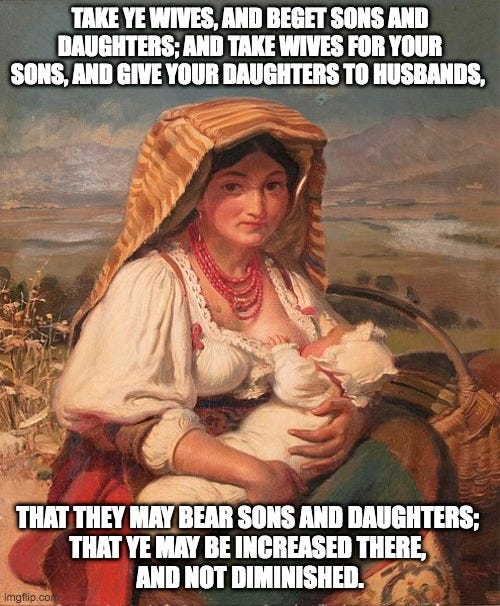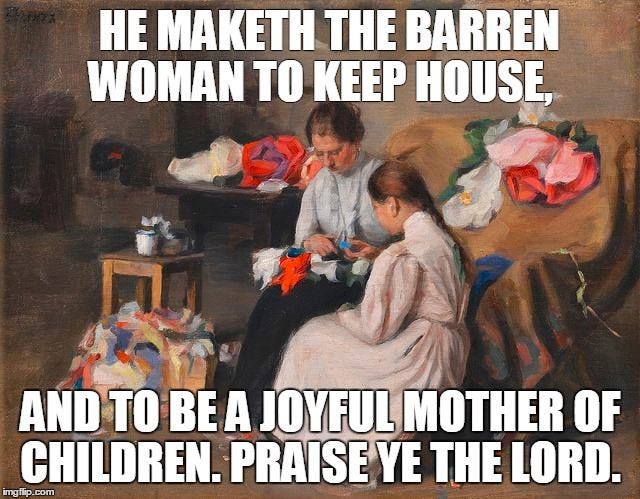INCHEL
Society is failing its women
From time to time, the internet is awash with discussions of men said to be ‘INCEL’: men who are involuntarily celibate (ie who would wish to have sex, but are not doing so for reasons they consider beyond their control). The definition and the discussion, range wildly from that point, but I would like to put forward another word for another group. The group has been spoken of frequently (although nowhere nearly as frequently as ‘INCEL’), but I want to give them an acronym:
INCHEL.
I am proposing this acronym for: women who are ‘involuntarily childless’. I’m using the term to cover that whole group: women who did not wish to have a child out of wedlock and never got married, women who got married young and found themselves unable to bear (or their husband’s infertile), women who put themselves on the pill for years and then found themselves childless… the whole gamut. To be an INCHEL, you have to:
1) Want, or have wanted, to conceive and bear your own children
and
2) Through choices you made unwittingly or biological reality or some combination of the two, you now find yourself childless and unlikely to be able to have children.
INCHEL is different from childfree (men or women who deliberately choose not to have children), although many childfree women started as INCHELs (and, I would suspect, many women in that category would have children if the opportunity presented itself.) An INCHEL is not someone who said, “I know if I take this job, I will not be able to ever have children, and I am deliberately making that choice”, although she may be the woman who was warned by her friends that taking that job would likely lead her to never having children.
The INCHEL woman is not someone who looked at a man willing to marry her and thus give her children and said, “I will not marry him, knowing that I will thus never have children,” although she may well have turned the man down, with that as the result.
The woman who marries young and then she and her husband settle down to diligently produce children, but biology doesn’t permit is technically and emotionally INCHEL; but the overwhelming majority of INCHEL fall into that category because of biology plus choices; and for most of them, the choices are the big influence. She could have had children at 20, but couldn’t at 40… well, it’s biology that she couldn’t at 40, but her choices put her there.
Contradictions
All too often, the INCHEL state is the result of contradictory desires on the part of the woman involved. She wanted several things out of life, including an education, a career, and not just to accept the first husband that came down the pike. INCHEL tends to happen when those conflicted. When the woman who wished to have children didn’t wish to marry the particular man who asked her. Or the woman who wished to have children wanted to get her education and early career done first.
Or a combination of these two. A woman who wishes to get her education and early career done, and then to start looking around for a man to have children with.
Gloria
Gloria is a 35-year-old RN. She got married young but went to school for nursing, worked in a hospital and then went to more school for nursing, so they decided to put her on the pill that whole time so that a child wouldn’t get in the way of her career.
And then, after she graduated and had worked for a while, and things seemed to be going well, she went off the pill… And found out she couldn’t conceive. Whether that was because she’d been on the pill all that time or whether that was because she was now 35[1], no one knows, but the point is she wants to have children and can’t have children.
Samantha
Samantha is 42 years old. She went to school at a prestigious university. Then, she went on to more schooling during her career, which was incredibly successful. Along the way, she had several men very interested in her, but they weren’t just good enough, and besides, her career was very interesting.
All the time, she was sure that she would one day get married and have children. But when at about 33, she decided it was time for that, the men had stopped coming around. Except for men who obviously weren’t even close to being what she was looking for. And all the men who had been interested before were now married. Suddenly, she woke up on the morning of her 42nd birthday, and she realised that she was never going to have children.
Ignorance
INCHEL also often happens because of ignorance. Either actual ignorance or a kind of willful blindness. ‘I can have children later’ or ‘I can find a good man later’ are very prevalent statements that lead a woman down the ‘INCHEL’ path.
Men
Men can technically be INCHEL, just as women can be INCEL, but in both cases, both the feelings and the number are far less. Assuming a lack of morality, pretty much any woman can have sex; thus, very few women are truly INCEL. And most men who wish for children have, I believe, an easier time getting married and thus having children, thus are not often involuntarily childless. And as far as feelings, the man is more often upset about the lack of sex, the woman the lack of children. So overall, the problem for men is ‘INCEL’, and the problem for women is ‘INCHEL’.
Society
Society is a funny word, especially in our modern age. Society consists, literally, of the thousands and millions and even billions of individuals that surround and inform us in our daily lives. Thus, we are tempted to say that there is no society; there are only individuals. But this would be a lie as society also includes history and structures.
Individual people can and do rise above their ‘society’ or sink below it. But it is still true that when see a problem affecting thousands and even millions of ‘individuals’, we still need to look at the society that surrounds them so that, even if we cannot change this or that individual, we can still change the atmosphere that surrounds them and, even more importantly, the atmosphere that will surround our children. (I was about to say ‘their children,’ but, of course, the whole point of this post is that they have none.)
We live in a dramatically anti-natalist society [see links below]. It is anti-natalist on pretty much every level. And anti-marriage at the same time. We need to change that root and branch. We need to recognise the phenomenon of ‘INCHEL’ as the disaster that it is. And not just a disaster but, for the most part, an active evil. The woman who sacrificed her childbearing for her career did an evil thing… even if she did it all unknowingly. And the society that promoted that evil thing is an evil society.
Every single time that a woman wishes to have children and can’t, within an actual marriage, that is a tragic thing. When it happens because of false, evil or naive doctrines of their society that tragedy is beyond a tragedy, it is an active evil. We as Christians, and, indeed, anyone at all sane, need to stand athwart the train wreck of this tragedy and say ‘enough’.
—
Thank you for reading Von’s Substack. I would love it if you commented! I love hearing from readers, especially critical comments. I would love to start more letter exchanges, so if there’s a subject you’re interested in, get writing and tag me!
Being ‘restacked’ and mentioned in ‘notes’ is very important for lesser-known stacks so… feel free! I’m semi-retired and write as a ministry (and for fun) so you don’t need to feel guilty you aren’t paying for anything, but if you enjoy my writing (even if you dramatically disagree with it), then restack, please! Or mention me in one of your own posts.
If I don’t write you back it is almost certain that I didn’t see it, so please feel free to comment and link to your post. Or if you just think I would be interested in your post!
If you get lost, check out my ‘Table of Contents’ which I try to keep up to date.
Von also writes as ‘Arthur Yeomans’. Under that name he writes children’s, YA, and adult fiction from a Christian perspective. His books are published by Wise Path Books and include the children’s/YA books:
The Bobtails meet the Preacher’s Kid: A Christian historical fiction chapter book about four orphans who go to live with their aunt on a dairy farm.
The Bobtails and the Cousins: The sequel to Preacher’s Kid. The aunt has married, and the cousins come to visit. Meaning town kids dealing with chores and manure and…
The Bobtails go to France: The sequel to cousins. The Bobtails, and Preacher’s Kid, get to take a trip to New York, London, Paris, and a small town in France. To get some cheese.
and
No Ordinary School: A brilliant but socially clueless boy gets recruited for a special school. Where he makes a lot of money, gets a girl, and solves a mystery.
As well as GK Chesterton’s wonderful book, “What’s Wrong with the World”, for which ‘Arthur’ wrote most of the annotations.
Arthur also has a substack, and a website. On the substack you can listen to some of his published books. Free.
Thanks again, God Bless, Soli Deo gloria,
Von
[1] A quick glance at the relevant research seems to deny that being on the pill for years can affect a woman’s fertility. But a longer glance at the actual research tells a different story:
a) They treat the numbers “72%-94%” (the rate of pregnancy within one year for a woman that had been on the pill) and 92% (the rate of pregnancy for a woman that had been using ‘natural family planning’) as ‘generally comparable’. Assuming an average of 83% (and I suspect the 72% is more accurate) for the pill then that is saying that 8% of women being infertile is the same as 17% of women being infertile. Tell that to the 9%!
b) They only compare birth control methods. They do not compare your fertility when you started the BC pill with your fertility when you stopped. And they do not compare with people who have been busy having children that whole time.
Numerous studies have demonstrated some delay in the time to conception in previous users of OCs who discontinued use in order to conceive, but this impairment appears to be temporary and typically limited to the early months following cessation of OC use. Reported 12-month conception rates in former cyclic OC users range from 72%-94% and are similar to those observed in women discontinuing intrauterine devices (71%-92%), progestin-only contraceptives (70%-95%), condoms (91%), and natural family planning (92%). There is a limited amount of data on the time to conception in women stopping extended-cycle and continuous-use OCs, but the data suggest that subsequent return to fertility is generally comparable to that of cyclic OCs.
https://pubmed.ncbi.nlm.nih.gov/19268187/
For couples in their 20s and early 30s with no known preexisting conditions, around one in four women will get pregnant in a single menstrual cycle. By age 40, that number drops to one out of every 10 women.
https://www.forbes.com/health/womens-health/female-fertility-by-age/







So I need to add SAHG to my acronym list… but what is the guy called?
I worry the acronym won’t stick. It lacks a sort of Je ne sais quoi to make it into the mind of the collective conscious. It’s obviously similar to “Incel” its progenitor, but it may not be distinct enough to till it’s own ground, so to speak.
Your article lays out the position very well, and I sincerely hope more people begin to consider this issue and take actual steps to prevent its reoccurrence in our society.